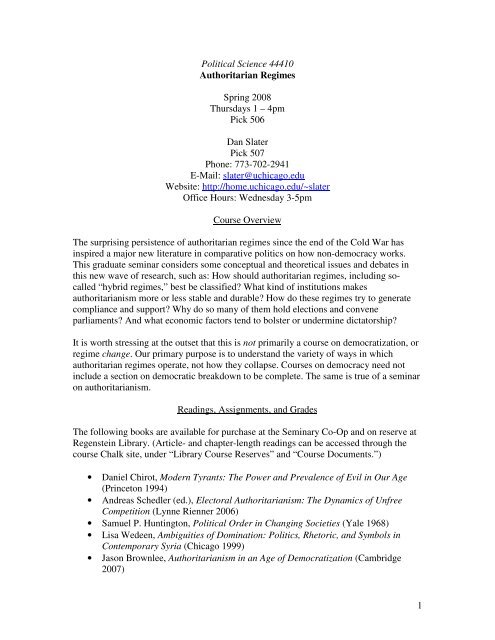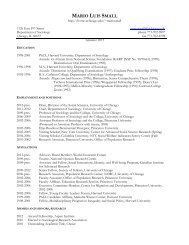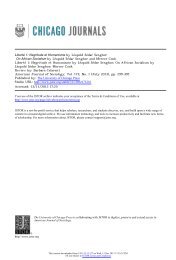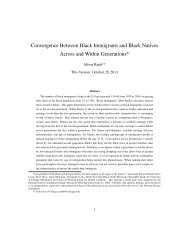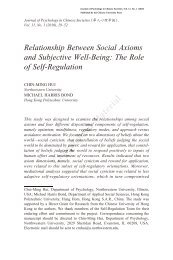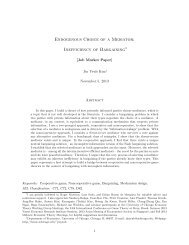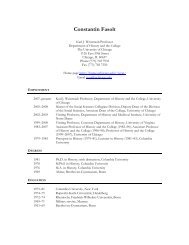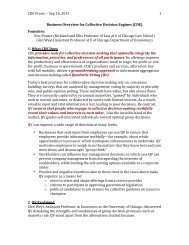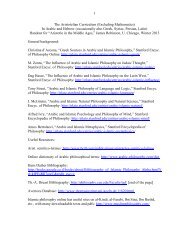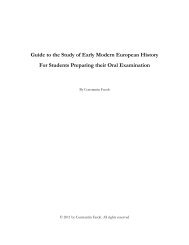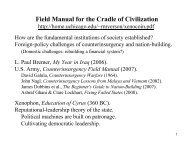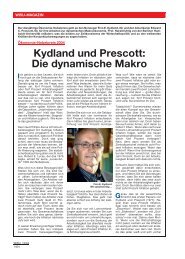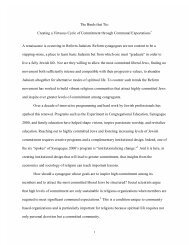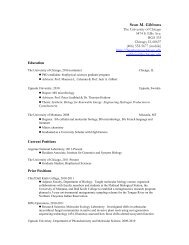Authoritarian Regimes - University of Chicago
Authoritarian Regimes - University of Chicago
Authoritarian Regimes - University of Chicago
You also want an ePaper? Increase the reach of your titles
YUMPU automatically turns print PDFs into web optimized ePapers that Google loves.
Political Science 44410<br />
<strong>Authoritarian</strong> <strong>Regimes</strong><br />
Spring 2008<br />
Thursdays 1 – 4pm<br />
Pick 506<br />
Dan Slater<br />
Pick 507<br />
Phone: 773-702-2941<br />
E-Mail: slater@uchicago.edu<br />
Website: http://home.uchicago.edu/~slater<br />
Office Hours: Wednesday 3-5pm<br />
Course Overview<br />
The surprising persistence <strong>of</strong> authoritarian regimes since the end <strong>of</strong> the Cold War has<br />
inspired a major new literature in comparative politics on how non-democracy works.<br />
This graduate seminar considers some conceptual and theoretical issues and debates in<br />
this new wave <strong>of</strong> research, such as: How should authoritarian regimes, including socalled<br />
“hybrid regimes,” best be classified? What kind <strong>of</strong> institutions makes<br />
authoritarianism more or less stable and durable? How do these regimes try to generate<br />
compliance and support? Why do so many <strong>of</strong> them hold elections and convene<br />
parliaments? And what economic factors tend to bolster or undermine dictatorship?<br />
It is worth stressing at the outset that this is not primarily a course on democratization, or<br />
regime change. Our primary purpose is to understand the variety <strong>of</strong> ways in which<br />
authoritarian regimes operate, not how they collapse. Courses on democracy need not<br />
include a section on democratic breakdown to be complete. The same is true <strong>of</strong> a seminar<br />
on authoritarianism.<br />
Readings, Assignments, and Grades<br />
The following books are available for purchase at the Seminary Co-Op and on reserve at<br />
Regenstein Library. (Article- and chapter-length readings can be accessed through the<br />
course Chalk site, under “Library Course Reserves” and “Course Documents.”)<br />
• Daniel Chirot, Modern Tyrants: The Power and Prevalence <strong>of</strong> Evil in Our Age<br />
(Princeton 1994)<br />
• Andreas Schedler (ed.), Electoral <strong>Authoritarian</strong>ism: The Dynamics <strong>of</strong> Unfree<br />
Competition (Lynne Rienner 2006)<br />
• Samuel P. Huntington, Political Order in Changing Societies (Yale 1968)<br />
• Lisa Wedeen, Ambiguities <strong>of</strong> Domination: Politics, Rhetoric, and Symbols in<br />
Contemporary Syria (<strong>Chicago</strong> 1999)<br />
• Jason Brownlee, <strong>Authoritarian</strong>ism in an Age <strong>of</strong> Democratization (Cambridge<br />
2007)<br />
1
Grades in this seminar will be based on three dimensions <strong>of</strong> course performance. First,<br />
each student is required to write three short (about 3-4 page) response papers to the<br />
weekly readings over the course <strong>of</strong> the quarter. These are worth 10% <strong>of</strong> your grade each,<br />
for a total <strong>of</strong> 30%. Which week these essays are written is at the student’s discretion, with<br />
one exception: everyone must contribute an essay on the readings in Week 3 (April 17th).<br />
Please e-mail me a copy <strong>of</strong> your essay by noon on the day <strong>of</strong> class, and hand in a hard<br />
copy <strong>of</strong> your essay at the beginning <strong>of</strong> seminar.<br />
Another 30% <strong>of</strong> your final grade will be based on class participation. Consistent<br />
attendance and engagement with the readings and in-class discussions are expected. The<br />
remaining 40% <strong>of</strong> your grade will be based on a take-home final examination,<br />
formatted loosely on the template <strong>of</strong> a qualifying Ph.D. exam.<br />
April 3: Class Introduction<br />
Course Schedule<br />
April 10: Totalitarianism as a Template<br />
• Daniel Chirot, Modern Tyrants, all.<br />
April 17: Problems <strong>of</strong> Classification<br />
• Juan J. Linz and Alfred Stepan, Problems <strong>of</strong> Democratic Transition and<br />
Consolidation: Southern Europe, South America, and Post-Communist Europe,<br />
Baltimore: Johns Hopkins <strong>University</strong> Press (1996), pp. 39-54.<br />
• Barbara Geddes, “<strong>Authoritarian</strong> Breakdown: Empirical Test <strong>of</strong> a Game Theoretic<br />
Argument,” paper presented at the annual meetings <strong>of</strong> the American Political<br />
Science Association, Atlanta (1999), pp. 1-33 + appendix.<br />
• Axel Hadenius and Jan Teorell, “<strong>Authoritarian</strong> <strong>Regimes</strong>: Stability, Change, and<br />
Pathways to Democracy, 1972-2003,” Working Paper, Lund <strong>University</strong><br />
(November 2006), pp. 1-24 + Appendix B.<br />
• Gerardo L. Munck, “Drawing Boundaries: How to Craft Intermediate Regime<br />
Categories,” in Schedler (ed.), Electoral <strong>Authoritarian</strong>ism, pp. 27-40.<br />
• Richard Snyder, “Beyond Electoral <strong>Authoritarian</strong>ism: The Spectrum <strong>of</strong> Non-<br />
Democratic <strong>Regimes</strong>,” in Schedler (ed.), Electoral <strong>Authoritarian</strong>ism, pp. 219-231.<br />
• Dan Slater, “Altering <strong>Authoritarian</strong>ism: Institutional Complexity and Autocratic<br />
Agency in Indonesia,” Unpublished Manuscript, pp. 1-36.<br />
• Lisa Wedeen, “Concepts and Commitments in the Study <strong>of</strong> Democracy,” in Ian<br />
Shapiro et. al. (eds.), Problems and Methods in the Study <strong>of</strong> Politics, New York:<br />
Cambridge <strong>University</strong> Press (2004), pp. 274-306.<br />
2
April 24: Order, Domination, and Compliance<br />
• Huntington, Political Order, pp. 1-92 and 140-191.<br />
• Gregory Kasza, The Conscription Society: Administered Mass Organizations,<br />
New Haven: Yale <strong>University</strong> Press (1995), pp. 7-25, 51-71, and 188-192.<br />
• Karen Stenner, The <strong>Authoritarian</strong> Dynamic, New York: Cambridge <strong>University</strong><br />
Press (2005), pp. 13-36.<br />
• John Gaventa, Power and Powerlessness: Quiescence and Rebellion in an<br />
Appalachian Valley, Urbana: <strong>University</strong> <strong>of</strong> Illinois Press, pp. 1-32.<br />
• Wedeen, Ambiguities <strong>of</strong> Domination, all.<br />
May 1: Party Hegemony and Regime Stability<br />
• Huntington, Political Order, pp. 397-461.<br />
• Aristide Zolberg, Creating Political Order: The Party-States <strong>of</strong> West Africa,<br />
<strong>Chicago</strong>: Rand McNally, pp. 9-36.<br />
• Benjamin Smith, “Life <strong>of</strong> the Party: The Origins <strong>of</strong> Regime Breakdown and<br />
Persistence under Single-Party Rule,” World Politics 57:3 (Spring 2005), pp. 421-<br />
451.<br />
• Kellee S. Tsai, “Adaptive Informal Institutions and Endogenous Institutional<br />
Change in China,” World Politics 59 (October 2006), pp. 116-141.<br />
• Joy Langston, “Elite Ruptures: When Do Ruling Parties Split?” In Schedler (ed.),<br />
Electoral <strong>Authoritarian</strong>ism, pp. 57-75.<br />
• Beatriz Magaloni, Voting for Autocracy: Hegemonic Party Survival and Its<br />
Demise in Mexico (2006), New York: Cambridge <strong>University</strong> Press, pp. 1-43.<br />
• Kenneth Greene, Why Dominant Parties Lose: Mexico’s Democratization in<br />
Comparative Perspective (2007), New York: Cambridge <strong>University</strong> Press, pp. 1-<br />
47.<br />
May 8: Durable <strong>Authoritarian</strong>ism in the Muslim World<br />
• Michael Ross, “Does Oil Hinder Democracy?” World Politics 53 (April 2001),<br />
pp. 325-361.<br />
• Alfred Stepan and Graeme Robertson, “An ‘Arab’ More than a ‘Muslim’<br />
Electoral Gap,” Journal <strong>of</strong> Democracy 14:3 (July 2003), pp. 30-44.<br />
• Eva Bellin, “Coercive Institutions and Coercive Leaders,” in Marsha Pripstein<br />
Posusney and Michelle Penner Angrist (eds.), <strong>Authoritarian</strong>ism in the Middle<br />
East: <strong>Regimes</strong> and Resistance, Boulder: Lynne Rienner (2005), pp. 21-41.<br />
• Michelle Penner Angrist, “Party Systems and Regime Formation: Turkish<br />
Exceptionalism in Comparative Perspective,” in Posusney and Angrist (eds.), pp.<br />
119-141.<br />
• Brownlee, <strong>Authoritarian</strong>ism in an Age <strong>of</strong> Democratization, pp. 1-152.<br />
3
May 15: Military <strong>Regimes</strong><br />
• Huntington, Political Order, pp. 192-263.<br />
• Morris Janowitz, Military Institutions and Coercion in the Developing Nations,<br />
<strong>Chicago</strong>: <strong>University</strong> <strong>of</strong> <strong>Chicago</strong> Press (1977), pp. 77-116.<br />
• Alfred Stepan, Rethinking Military Politics: Brazil and the Southern Cone,<br />
Princeton: Princeton <strong>University</strong> Press (1988), pp. 3-29.<br />
• Kirk S. Bowman, Militarization, Democracy, and Development: The Perils <strong>of</strong><br />
Praetorianism in Latin America, <strong>University</strong> Park: Penn State <strong>University</strong> Press<br />
(2002), pp. 19-41.<br />
• Dan Slater and Christopher Haid, “The Worst Kind <strong>of</strong> War: Regional Rebellions<br />
and Political Militarization in the Post-Colonial World,” Unpublished Manuscript,<br />
pp. 1-34.<br />
• Steven A. Cook, Ruling But Not Governing: The Military and Political<br />
Development in Egypt, Algeria, and Turkey, Baltimore: Johns Hopkins <strong>University</strong><br />
Press (2007), pp. 1-31.<br />
• Babar Sattar, “Pakistan: Return to Praetorianism,” in Muthiah Alagappa (ed.),<br />
Coercion and Governance: The Declining Political Role <strong>of</strong> the Military in Asia,<br />
Stanford: Stanford <strong>University</strong> Press (2001), pp. 385-412.<br />
May 22: Coalitional Foundations <strong>of</strong> <strong>Authoritarian</strong>ism<br />
• Barrington Moore, Social Origins <strong>of</strong> Dictatorship and Democracy: Lord and<br />
Peasant in the Making <strong>of</strong> the Modern World, Boston: Beacon (1966), pp. 433-<br />
452.<br />
• Gregory M. Luebbert, “Social Foundations <strong>of</strong> Political Order in Interwar Europe,”<br />
World Politics 39:4 (July 1987), pp. 449-478.<br />
• David Waldner, “Democracy and Dictatorship in the Post-Colonial World,”<br />
Unpublished Manuscript, pp. 1-35.<br />
• David Waldner, “Democracy and Dictatorship in Southeast Asia: The Origins <strong>of</strong><br />
the Indonesian New Order and the Thai Non-Order,” Unpublished Manuscript,<br />
pp. 1-42.<br />
• Thomas Pepinsky, “Coalitions and Crises: <strong>Authoritarian</strong>ism, Adjustment, and<br />
Transitions in Emerging Markets, Ph.D. Dissertation, Yale <strong>University</strong> (2007), pp.<br />
16-29, 68-119, and 246-357.<br />
• Dan Slater, “Ordering Power: Contentious Politics, State-Building, and<br />
<strong>Authoritarian</strong> Durability in Southeast Asia,” Ph.D. Dissertation, Emory <strong>University</strong><br />
(2005), pp. 1-27, 78-94, 263-350, 365-385, and 422-447.<br />
4
May 29: Political Economy Approaches<br />
• Ronald Wintrobe, The Political Economy <strong>of</strong> Dictatorship, New York: Cambridge<br />
<strong>University</strong> Press (1998), pp. 127-162.<br />
• Carles Boix, Democracy and Redistribution, New York: Cambridge <strong>University</strong><br />
Press (2003), pp. 1-43.<br />
• Daron Acemoglu and James A. Robinson, Economic Origins <strong>of</strong> Dictatorship and<br />
Democracy, New York: Cambridge <strong>University</strong> Press (2006), pp. 1-47.<br />
• Eva Bellin, “Contingent Democrats: Industrialists, Labor, and Democratization in<br />
Late-Developing Countries,” World Politics 52:1 (January 2000), pp. 175-205.<br />
• Kellee S. Tsai, “Capitalists Without a Class: Political Diversity Among Private<br />
Entrepreneurs in China,” Comparative Political Studies 38:9 (November 2005),<br />
pp. 1130-1158.<br />
• Mick Moore, “Death Without Taxes: Democracy, State Capacity, and Aid<br />
Dependence in the Fourth World,” in Mark Robinson and Gordon White (eds.),<br />
The Democratic Development State: Politics and Institutional Design, Oxford:<br />
Oxford <strong>University</strong> Press (1998), pp. 84-121.<br />
• Kevin Morrison, “Non-Tax Revenue and the Redistributional Foundations <strong>of</strong><br />
Regime Stability,” Unpublished Manuscript, pp. 1-32.<br />
June 5: Hybrid <strong>Regimes</strong>, Elections, and Parliaments<br />
• Schedler, Electoral <strong>Authoritarian</strong>ism, chs. 1, 6-7, and 10-12.<br />
• Jennifer Gandhi and Adam Przeworski, “<strong>Authoritarian</strong> Institutions and the<br />
Survival <strong>of</strong> Autocrats,” Comparative Political Studies 40:11 (November 2007),<br />
pp. 1279-1301.<br />
• Gary Cox, “<strong>Authoritarian</strong> Elections and Leadership Succession,” Working Paper,<br />
pp. 3-17.<br />
• Ellen Lust-Okar, “Elections Under <strong>Authoritarian</strong>ism: Preliminary Lessons from<br />
Jordan,” Democratization 13:3 (June 2006), pp. 456-471.<br />
• Benedict Anderson, The Spectre <strong>of</strong> Comparisons: Nationalism, Southeast Asia,<br />
and the World, New York: Verso (1998), pp. 265-284.<br />
* FINAL TAKE-HOME EXAMS DISTRIBUTED AT 8AM TUESDAY, JUNE 10 TH ;<br />
HARD COPIES DUE IN MY BOX IN PICK 401 BY 4:30PM THAT SAME DAY *<br />
5


